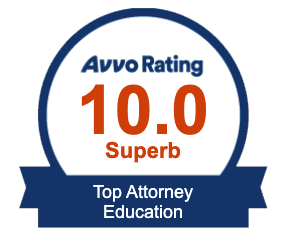How many times have you attended an IEP meeting, an IDEA eligibility meeting, a meeting to secure consent for an evaluation, or a manifestation determination meeting only to handed a brochure or document that states your parental rights under the IDEA. At first glance, most of the typewritten material on this document is in small print. It is as if the school system is trying to save paper. We applaud the school system for being envrionmentally consicious but do you have to take out your reading glasses or magnifying glass every time you want to read your parental rights? And what does all of this small print mean? You either have to be a lawyer or someone who has a doctoral degree to understand your parental rights. In fact, if you scan this document into Microsoft Word you can determine the reading level of the form using Microsoft Word. In Georgia, the parental rights form developed by most school systems is around the 14th year level, which means that the reading level of the parental rights form is the 2nd or 3rd year in college.
A few years ago, I filed a state complaint against the Georgia Department of Education claiming that the parental rights form is unreadable for the general public. The IDEA requires that the parental rights form meet the requirements of 34 C.F.R. 300.503(c). This section states that the parental rights form must be written in language understandable to the general public and provided in the native language of the parent or other mdoe of communicationused by the parent unless it is not feasible to do so. You may ask what is “language understable to the general public?” There is no definition of this phrase. Common sense, however, tells us that it must readable by virtually parent that attends a meeting in which parental rights are given to the parent.
Anyway, getting back to the state complaint I filed, the Georgia Department of Education agreed to revise the parental rights form. The State Special Education Director convened a large workgroup to rewrite the parental rights form. A few months later, we completed this task. The State Department distributed this revised form to school systems. The form was definitely an improvement over the former parental rights form: larger print and more parent friendly language. But another special education attorney in Georgia complained that the parental rights form did not contain and explain all of the parental rights set forth in 34 C.F.R. 300.504(c). Consequently, the Special Education balked and stopped distribution the revised parental rights form to school systems. As a result, only if parents search the Georgia Department of Education website can they find this revised parental ftiendly parental rights form. School systems have returned to distribuing their own version of parental rights in small print and legalese. So we are virtually back to square one in trying to educate parents about their parental rights under the IDEA. And for those students that turn 18 years old while still in special education, they have the task of reading and interpreting the parental rights form.
What are parental rights and is every right important to know? Well, that depends upon your perspective and interest in this issue. In the next blog and post, I will discuss in more detail some of your parental rights form that I think are critical to protect and safeguard a parent’s right to ensure that their child receives a free appropriate public education under the IDEA.

